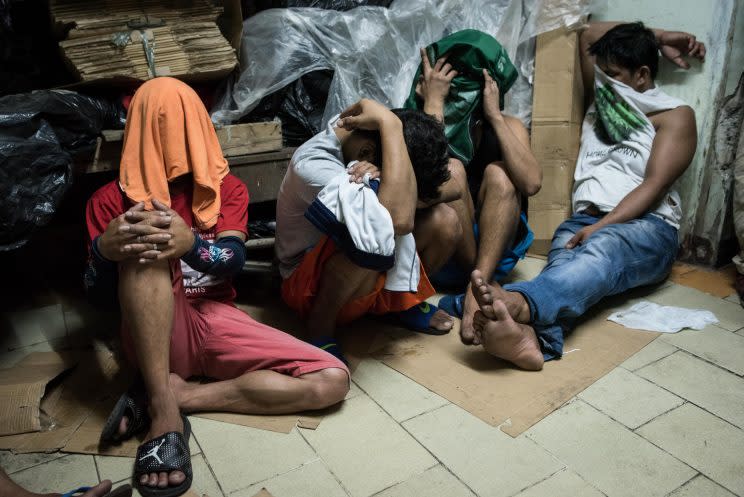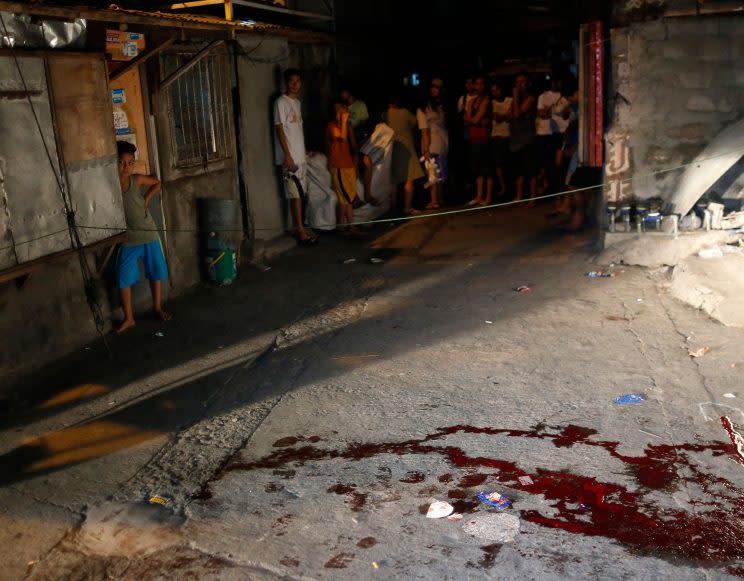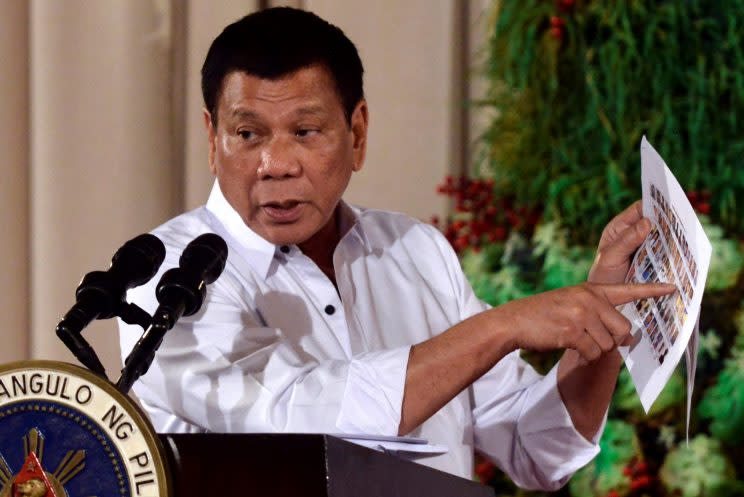Trump invited Duterte to the White House. Here are some outrageous things the Philippine leader has said.

President Trump shocked both human rights advocates and, reportedly, members of his own administration this weekend when he extended an invitation for a White House visit to Rodrigo Duterte, the outlandish authoritarian president of the Philippines.
Duterte said he might be too busy to swing by Washington, but the invitation itself is striking.
He has been been accused of inciting extrajudicial killings as part of a violent crackdown on drug abuse and crime that’s resulted in thousands of civilian deaths since he took office last June.
Though he has previously refuted comparisons to Trump, Duterte rose to power following a similarly unconventional and controversial populist campaign last year.
Well before he was elected, Duterte had become the subject of international headlines and condemnation with an unfiltered string of inflammatory, crass and often violent statements that have continued into his presidency.
“Give me salt and vinegar and I’ll eat his liver.”
In perhaps one of his most unsavory statements to date, Duterte threatened to eat terrorists alive while speaking at the kickoff of a national sports tournament in Laos last month.
The gruesome comments followed a foiled terror attack on the resort island of Bohol by Islamic militants. Duterte had ordered troops to kill the suspected extremists behind the plot but, he warned the crowd, he could easily be “50 times” more brutal than the terrorists themselves if provoked, threatening to eat their organs if captured alive.
“Just drive me to extreme anger, and I can eat a person,” he said. “Give me salt and vinegar and I’ll eat his liver.”
“You know, I am capable of eating a person,” he insisted. “If you anger me, in truth, I will eat you alive. Raw.”

“If you are corrupt, I will fetch you using a helicopter to Manila and I will throw you out.”
Back in December, Duterte claimed that he’d once thrown someone out of a helicopter — warning double-dealing politicians that he wouldn’t hesitate to do the same to them.
“If you are corrupt, I will fetch you using a helicopter to Manila and I will throw you out,” Duterte declared during a televised speech to typhoon victims. “I have done this before; why would I not do it again?”
Within a couple of days, however, Duterte had backed away from the claim, first responding incredulously when asked about it during an interview with Philippine news channel ABS-CBN. He later denied the story to CNN Philippines, saying, “We had no helicopter. We don’t use that.”
“If you know of any addicts, go ahead and kill them yourself.”
The 71-year-old former mayor was elected president of the archipelago last year after a campaign filled with profanity and threats of violence in a bloody war against drugs and crime.
Duterte briefly tempered his typically incendiary language for his first official speech after taking the oath of office in June 2016, but by that night he’d resumed threatening to kill drug addicts and even encouraged civilians to do so themselves.
“These sons of whores are destroying our children. I warn you, don’t go into that, even if you’re a policeman, because I will really kill you,” the newly minted president told an audience of about 500 people in a Manila slum. “If you know of any addicts, go ahead and kill them yourself, as getting their parents to do it would be too painful.”

“Hitler massacred 3 million Jews. … Now there is 3 million drug addicts. I’d be happy to slaughter them.”
Last September, Duterte made international headlines when he invoked Adolf Hitler while comparing his brutal drug war to the Holocaust.
“Hitler massacred 3 million Jews,” he told reporters, incorrectly citing half the number of Jews actually killed under the Nazi regime. “Now there is 3 million drug addicts [in the Philippines]. I’d be happy to slaughter them.”

“Please don’t order me around.”
An average 1,015 people have been reportedly killed each month by police or vigilantes since Duterte took office on June 30, 2016. By mid-December, the death toll in Duterte’s war on drugs had reportedly surpassed 6,000 — with the leader lashing out at anyone who dare try to get in his way.
The United Nations
Last August, Duterte threatened to “separate” from the United Nations after two U.N. human rights experts called the Philippine president’s drug war an “incitement to violence and killing, a crime under international law.”
The European Union
Duterte dismissed the EU as “hypocritical” after the European Parliament this past September condemned his violent antidrug initiative and urged him to stop “the current wave of extrajudicial executions and killings.”
“They’re taking the high ground to assuage their feelings of guilt,” Duterte fired back, arguing that European leaders were simply trying to make up for the “thousands” of Arabs and others killed by their colonial predecessors. “Now the EU has the gall to condemn me.”
The Supreme Court of the Philippines
Last summer, Duterte went on television and announced the names of those he believed to be “narcos.” His list included the names of several politicians, judges and police officers.
In a letter to the president, Maria Lourdes Sereno, chief justice of the Philippine Supreme Court, called the announcement “premature” and said she’d recommend that the four judges on his list not report to the police until they’ve been issued arrest warrants.
“Please don’t order me around,” Duterte warned Sereno. “Or would you rather that I declare martial law?”
“Son of a whore”
Duterte was scheduled to meet with President Obama while the two were in Laos for the annual Association of Southeast Asian Nations, or ASEAN, summit last September. That was until the Philippine president called Obama a “son of a whore.”
The insult was hurled during a press conference ahead of the summit, when a reporter asked about the possibility that Obama might confront Duterte about the human rights concerns raised by his deadly drug war.
“You must be respectful. Do not just throw away questions and statements. Son of a whore, I will curse you in that forum,” Duterte said, suggesting that he would not stand to be lectured about human rights. “We will be wallowing in the mud like pigs if you do that to me.”
The meeting was soon canceled, as Duterte’s comments made Obama question whether such a meeting would be “actually productive.”
Duterte later expressed regret for insulting Obama, though it was hardly the first time he’d called someone a “son of a whore.” In fact, he appears to throw the slur around quite often, using it to describe anyone from drug lords to the U.S. ambassador to the Philippines, and even the pope.

“I was mad she was raped, but she was so beautiful. I thought, the mayor should have been first.”
Just one month before he was elected president, Duterte became the subject of widespread scrutiny after a video was posted on YouTube that showed him making jokes about a female missionary from Australia who was raped and killed during a prison riot in the southern city of Davao in 1989.
“They raped all of the women. … There was this Australian lay minister. … When they took them out … I saw her face and I thought, ‘Son of a bitch.’ What a pity … they raped her, they all lined up,” Duterte, who was the mayor of Davao at the time, said in the video. “I was mad she was raped but she was so beautiful. I thought, ‘The mayor should have been first.’”
“When I take Viagra, it stands up.”
At a campaign event in April, Duterte boasted about his womanizing and spoke unabashedly about his use of the little blue pill.
“I was separated from my wife. I’m not impotent,” Duterte told a crowd of businessmen. “What am I supposed to do? Let this hang forever? When I take Viagra, it stands up.”
“Donald Trump is a bigot, I am not.”
Despite their shared affinity for unfiltered, inflammatory rhetoric, Duterte rejected comparisons between his unconventional presidential campaign and that of Donald Trump.
“Donald Trump is a bigot, I am not,” Duterte told the Associated Press back in March 2016, referring to then-candidate Trump’s proposal to bar Muslims from the U.S.
Duterte has since softened his stance on Trump, reportedly promising to “maintain … and enhance the bilateral ties between our two countries” during a brief congratulatory call to the U.S. president-elect in December. Both men had reportedly invited each other to visit their respective countries during that call.


